What Now? (Our Life In Exile)
So the last time I preached, Peter came up to me afterward and said, “Thank you for taking time to ask, “What now? What do we do with all this?” He told me he appreciates that I always manage to land there and how getting practical is often difficult. While I externally thanked him, internally I couldn’t help but laugh a bit, because the truth is, it never feels natural. Typically what happens is that I’m plugging away on my manuscript when I notice my overall word count and I have this “Oh crap!” moment. I realize I haven’t left myself enough time to bring a journey through a text and its history home. So then I find myself trying to wedge some kind of response to that question in at the very end, and for me, it always comes out a little clunky, a little forced, like an afterthought. Scripture has just carried us through all this beauty and ache and possibility, and then it’s like: Here’s a thought on what to do now. Amen.
What Guides Your, “What Now?”
So this time I thought we’d try something different. Let’s not tack it on at the end, let’s start there. Let’s start with the question itself: what now?
But let’s also notice: what now means different things depending on what you believe about God.
For many Christians, the “what now” is heavy with anxiety. If salvation is uncertain, if heaven or hell hangs in the balance, then the “what now” is about securing your spot. So you hustle to perform morality well enough, or to clock perfect Sunday attendance, or to join the right tribe with the right beliefs so you get the divine thumbs-up.
For others, maybe those who are a bit more certain of their salvation, “what now” becomes singularly focused on evangelism, because if getting to heaven is everything, then the urgent task is to make sure you and everyone else check the right theological boxes before the last breath. Life becomes a recruiting drive.
For yet others, “what now” becomes a battle cry to join culture war. If Christianity is perceived as under threat, then “what now” morphs into a call to political activism, where faith becomes weaponized. Everything becomes filtered through the lens of us-versus-them, winning and losing, with salvation itself seemingly tied to political victories. The urgent task becomes reclaiming cultural power, defending “Christian values,” and restoring a mythical golden age when faith supposedly dominated society.
“What Now?” At The Sanctuary
But here at The Sanctuary, if we’re consistent in our theology, none of these responses are really options. After all, the crux of the message is that God is better than you thought. By “better,” we mean that God loves you relentlessly. Ultimately, whether in this life or eternity, divine love will captivate you. Heaven will eventually come to earth, and you will be part of it, not because we create it, but because God will.
At the same time, if we’re not stressing about heaven or hell, and we know only Christ can fully bring his rule and reign on early, then life can start to feel like a waiting room … unless we’re given another path forward.
“What Now?” And Love
Here the words of the 8th-century Sufi mystic Rabia of Basra can be helpful as we think about another path. She said: “I want to carry a torch in one hand and a bucket of water in the other—so that I can set fire to heaven and put out the flames of hell. Then people will love God not for fear of punishment or desire of reward, but simply for love.”
In other words, if heaven and hell can no longer serve as carrots or sticks, then love itself becomes the center of the story.
And you know what, that actually rests more in alignment with the Bible than any of the previously mentioned options. As you read the story, God never seems obsessed with getting people into heaven. Especially in the Hebrew Bible, God’s obsession is with a people embodying love and justice here, so that the nations might see who God is. The question was never, how do I escape this life? It was always, how do I live this life in such a way that God’s character is revealed?
What does it look like to live from our love of God not because there’s some kind of temporal or eternal transaction going on, but simply because we love God?
So this morning I want to unpack how the narrative of the Bible, both the Hebrew and Christian testaments, address that question?
Israel’s Initial, “What Now?”
The first time we see Israel invited into the what now story is in their formation moment, fresh out of Egypt. They’ve been yanked out of slavery, out of brick quotas and Pharaoh’s lash, and now they’re standing in the wild, trying to remember what it feels like to breathe.
Before a single commandment is spoken, God lays before them is staggering vision: “Now therefore, if you will indeed obey my voice and keep my covenant, you shall be my treasured possession among all peoples, for all the earth is mine; and you shall be to me a kingdom of priests and a holy nation.’”
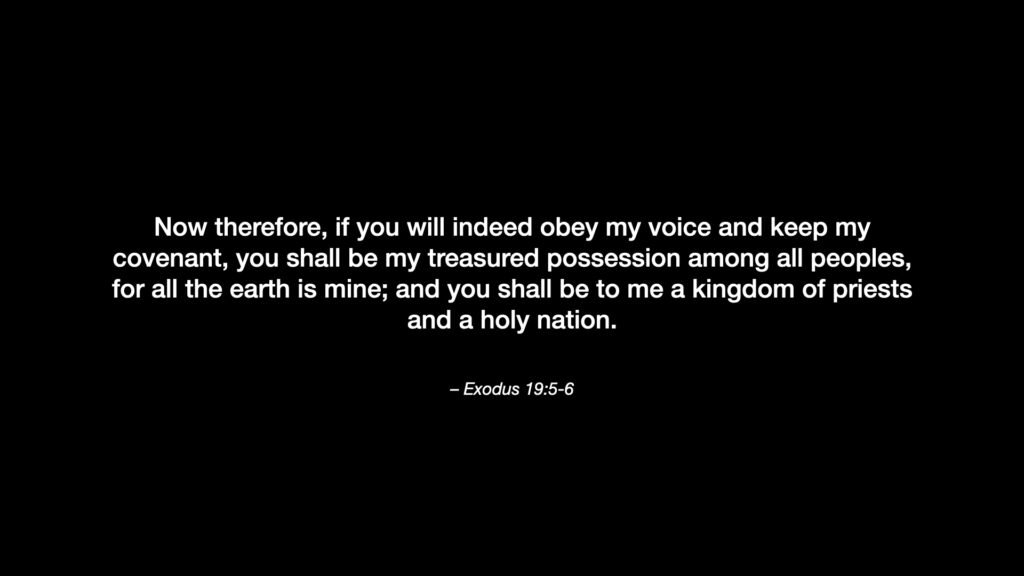
The people are not just freed from something, they’re freed for something. Freed to reveal, to embody, to stand in the middle of the nations as a living window into who God is.
But this is only made possible by an act of grace. Exodus 20 opens: “I am the Lord your God who brought you out of Egypt, out of the land of slavery.” That’s the relentless love. That’s the foundation. Everything that follows is not a collection of random rules, but a curriculum of formation, teaching a people how to live as free priests who reveal God’s justice, mercy, and love.
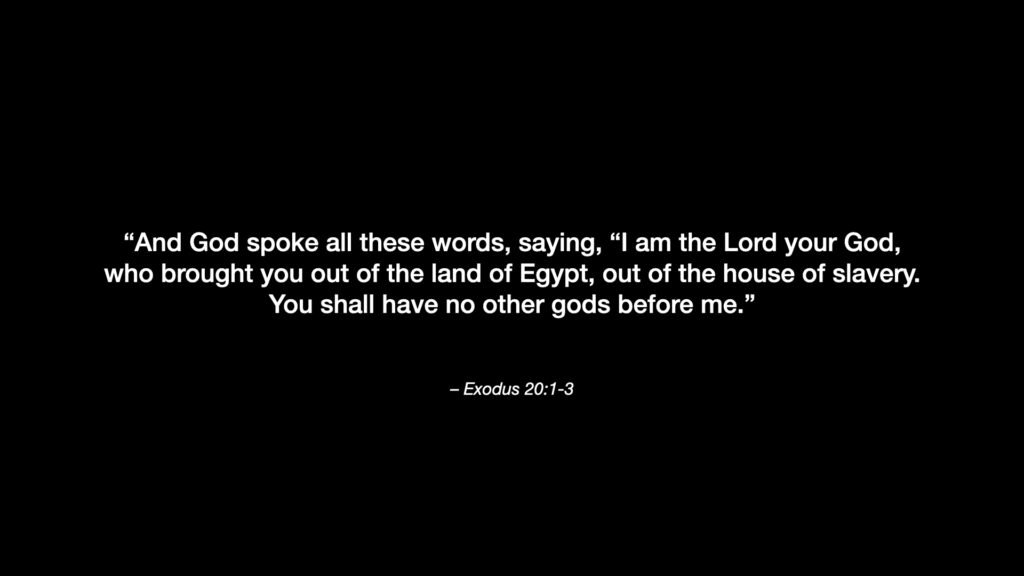
“What Now?” Not Embodied
But while Sinai casts the breathtaking vision, the bulk of the Hebrew Bible shows the heartbreak of how often that vision was missed.
From the moment they set foot in the Promised Land, Israel struggled to live as a kingdom of priests. Instead of revealing who God is, they repeatedly adopted the patterns of the nations around them: bowing to false gods, cutting corners on justice, exploiting the vulnerable, forgetting the very commands that were supposed to mark them as different.
Even when reform came, it was partial. The clearest example? The Jubilee, a radical reset every fifty years: one where all debts was canceled, all slaves were freed, and any land transactions were undone returning property to its original owners. But Israel never practiced it. Not once. They corrected course just enough to keep the system running, but never all the way to God’s vision.
So the story from Joshua through Kings is essentially the story of a priestly people forgetting their vocation. They were chosen to reveal God’s character, but more often than not, they revealed Pharaoh’s. Which is why the prophets thundered and wept. It’s also why Jerusalem fell and the people were taken into exile.
There Is No Christian Nation
But before we unpack the story of exile, we need to be clear about something. The Bible’s vision of a theocratic nation-state ended with the fall of Jerusalem in 587 BCE. What Israel briefly attempted in the land, life as a holy nation-state, is not on the table for us. Not in America, not anywhere. Under Jesus, there is no such thing as a “Christian nation.” Jesus never called for one, never built one, never promised one. When he spoke of the kingdom, it was always every tribe, every tongue, every nation gathered … never one nation-state exalted above the rest.
Attempts At A Christian Nation
Despite it being out of line with the way of Jesus, much of American Christianity has tried to put the concept of a Christian nation back on the table. From the Pilgrims onward, there has been this deep impulse to see this land as a “new Israel.” Colonies were founded with Bible verses etched into their charters, preachers thundered that America was God’s chosen people, and generation after generation we have repeated the myth that if we could just legislate the right morals or elect the right leaders, we could make this nation holy.
So when the church sets out to build a “Christian nation,” it isn’t fulfilling the gospel, it’s undermining it. And history bears the scars: colonization baptized in the name of Christ, slavery defended from pulpits, laws written to protect privilege rather than the vulnerable. That’s not the Kingdom of God, that’s Pharaoh’s pyramid with a steeple and a cross.
This means our attempts at forming a Christian nation aren’t something to celebrate, they’re something to confess, because only when we confess how we’ve tried to make this land a promised land can we begin to live faithfully in it.
So what do we find on the other side of confession? A new possibility emerges as Israel’s story moves forward.
Israel in Exile
After generations of compromise (idolatry, injustice, exploitation) the people who were meant to reveal God’s character to the nations ended up looking just like every other nation. And so Babylon comes. Jerusalem falls. The temple, the very symbol of God’s presence, is reduced to rubble. The people are dragged hundreds of miles east, away from home, away from land, away from everything that had once anchored their sense of identity.
That said, exile is not the same thing as slavery. In Egypt, Israel’s bodies were shackled, their labor exploited, their future crushed. In Babylon, they weren’t chained or forced into brick quotas. Exile is dislocation. It was the ache of being strangers in a strange land, of living under foreign gods, of trying to sing the Lord’s song in a place that didn’t share the tune.
The Babylonian Project
And Babylon’s project wasn’t to enslave them but to integrate them. To absorb them into the empire’s story. To dress like Babylonians, worship like Babylonians, live like Babylonians. It was assimilation by design.
The glue of that assimilation, it’s something every empire needs: a unifying narrative, something that tells its people who they are, why the world works the way it does, and what their place in it is. For Babylon, that story was the Enuma Elish, their creation epic.
The purpose of Creation Epics
Now creation epics as a whole are humanity’s oldest way of wrestling with the most essential questions: Where did we come from? Why are we here? What’s our purpose? Every ancient civilization crafted these stories, weaving together their deepest beliefs about the cosmos, humanity, and the gods. These weren’t just entertaining tales, they were fundamental frameworks that structured entire societies, shaping everything from how people viewed authority to how they understood suffering.
What makes these epics so powerful is how they encoded an entire worldview. When you knew the creation story of your people, you knew your place in the social order. You understood who held power and why. You learned whether the world was fundamentally good or violent, whether humans were beloved or merely useful, whether the divine was generous or capricious.
Most importantly, these stories weren’t neutral. They justified the existing power structures, explaining why kings ruled, why temples received tribute, why some people were free while others served. Creation myths were political documents dressed in cosmic language.
The Enuma Elish
In the Babylonian creation story, the Enuma Elish, the world is born out of violence. The gods wage war, and when the goddess Tiamat is slain, her body is split in two to form heaven and earth. Humanity is fashioned from the blood of a defeated god, created not in dignity but in servitude: to carry the gods’ burdens, to feed their appetites, to keep the machine running. That was Babylon’s story: the world is built on conquest, and you exist to serve power.
And Israel was now part of that conquest. According to the story, when Jerusalem fell, Marduk killed Yahweh, meaning that Marduk’s story gets to live on as Yahweh’s fades into memory.
And this is what makes exile so dangerous. If you live long enough inside someone else’s story, you start to forget your own.
Israel’s Response to Babylon
So the leaders of Israel did something radical. They wrote a new creation story. A counter-narrative. One that insisted that Yahweh lives on because the story of Yahweh stands over every other story.
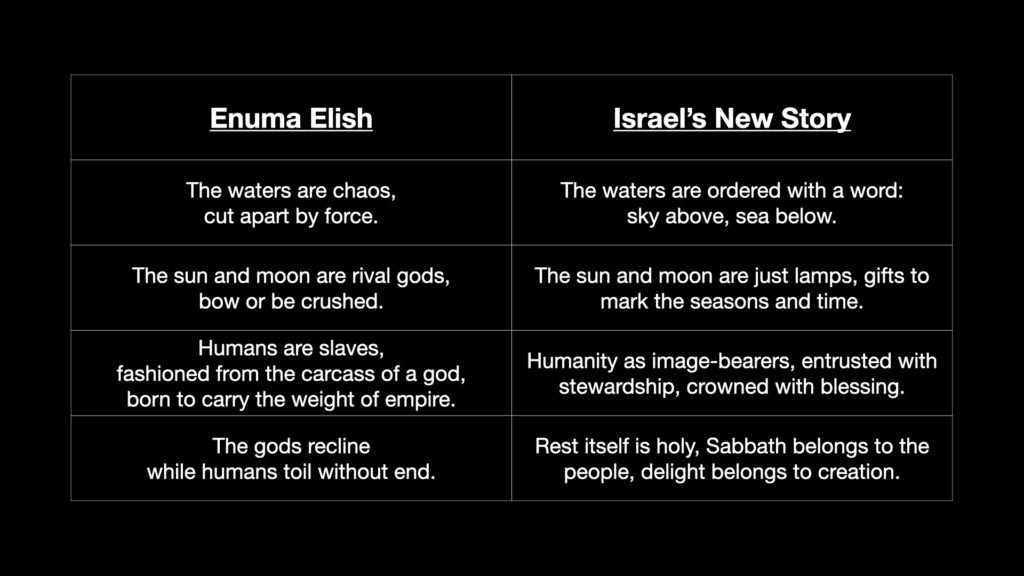
While Babylon’s story roared with violence: the waters are chaos, cut apart by force.
Yahweh sings with gentleness: the waters are ordered with a word: sky above, sea below.
Babylon thundered with fear: the sun and moon are rival gods, bow or be crushed.
Yahweh whispers with wonder: the sun and moon are just lamps, gifts to mark the seasons and time.
Babylon commanded with blood: humans are slaves, fashioned from the carcass of a god, born to carry the weight of empire.
Yahweh proclaims dignity: humanity as image-bearers, entrusted with stewardship, crowned with blessing.
Babylon boasted with arrogance: the gods recline while humans toil without end.
Yahweh blesses with joy: rest itself is holy, Sabbath belongs to the people, delight belongs to creation.
Do you feel it? Side by side, element by element, Yahweh’s story answers Babylon’s myth.
Today, we call this radical act of resistance Genesis, chapter one.
That was the work of the priests, reshaping the imagination of the people so they wouldn’t forget who they were, even when their experience told them otherwise.
Israel’s Life in Exile
But story alone isn’t enough. A story tells you who you are, but you also need practices to show you how to live. And this is where the prophet Jeremiah steps in. While the priests gave Israel Genesis 1, the prophet Jeremiah wrote them a letter, one that spoke of God’s plans for them, a hope, a future, and a return home.
This is the part of Jeremiah 29 we’re most familiar with:
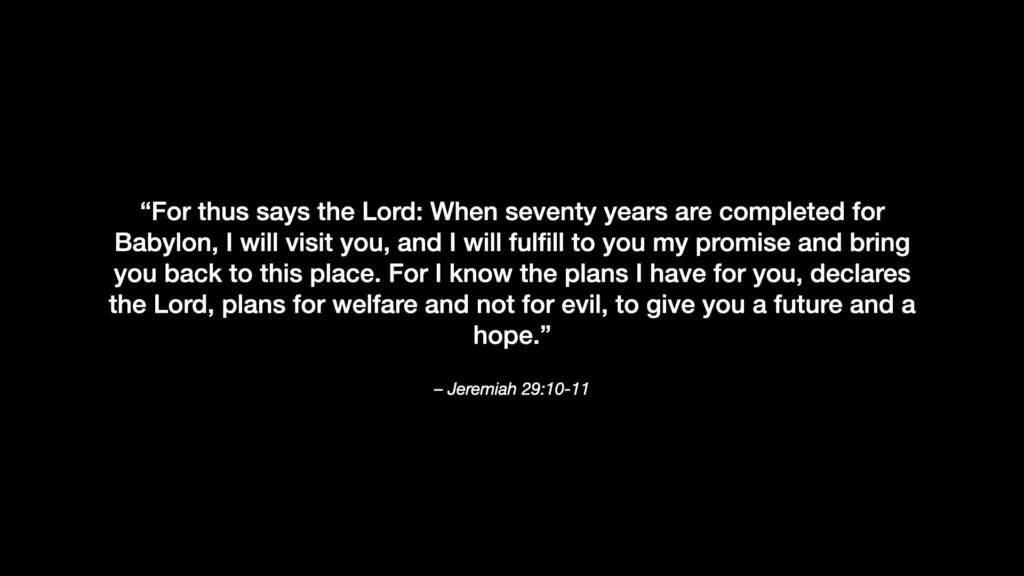
But in the meantime, as they waited for the return, as they spend 70 years in exile, Jeremiah gave them a set of practices:
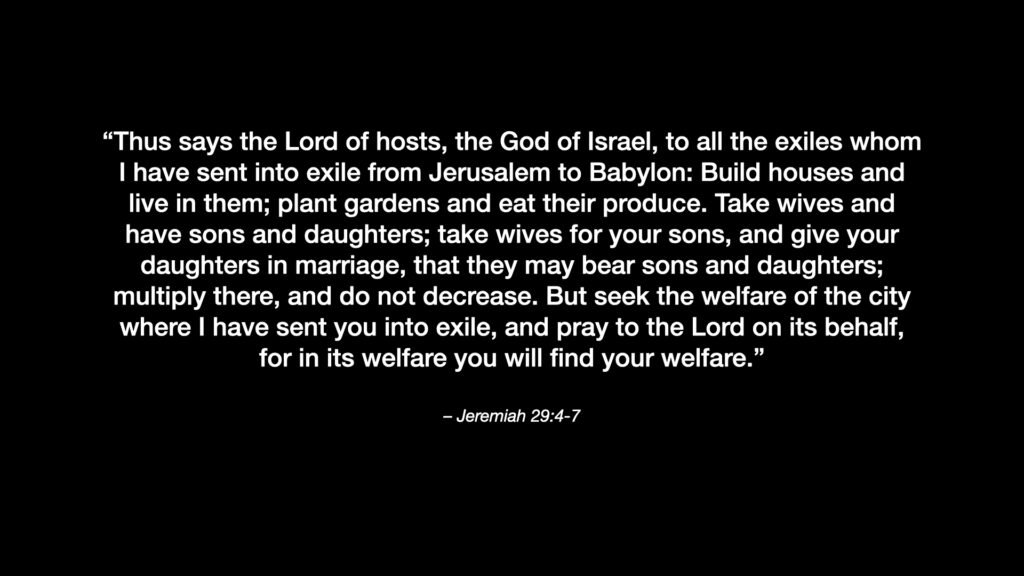
So you see the practices? Build houses. Plant gardens. Seek the peace of the city. Pray for it.
And here’s where Genesis 1 and Jeremiah 29 meet. Genesis 1 gives the story that makes the practices possible: you are image-bearers, created for fruitfulness, peace, and rest. Jeremiah gives the practices that embody that story: build, plant, seek, pray. Together, they form Israel’s exilic vocation, to live in Babylon without becoming Babylon.
American, A New Babylon
But living in Babylon without becoming Babylon isn’t just Israel’s calling, it’s ours, because Babylon never really went away, it just keeps changing its name. Today, one manifestation of Babylon, is America.
That might sound a bit shocking, but America’s story is written in frontier language: new worlds to conquer, endless horizons to expand, manifest destiny to fulfill. It’s the story of self-made men and chosen people, of progress that never stops and wealth that never runs out.
It’s a story baptized in blood, the blood of Indigenous peoples displaced, the blood of enslaved Africans whose labor built its wealth, the blood of foreign nations exploited for their resources under the guise of expanding democracy, the blood of immigrants used up and discarded when convenient.
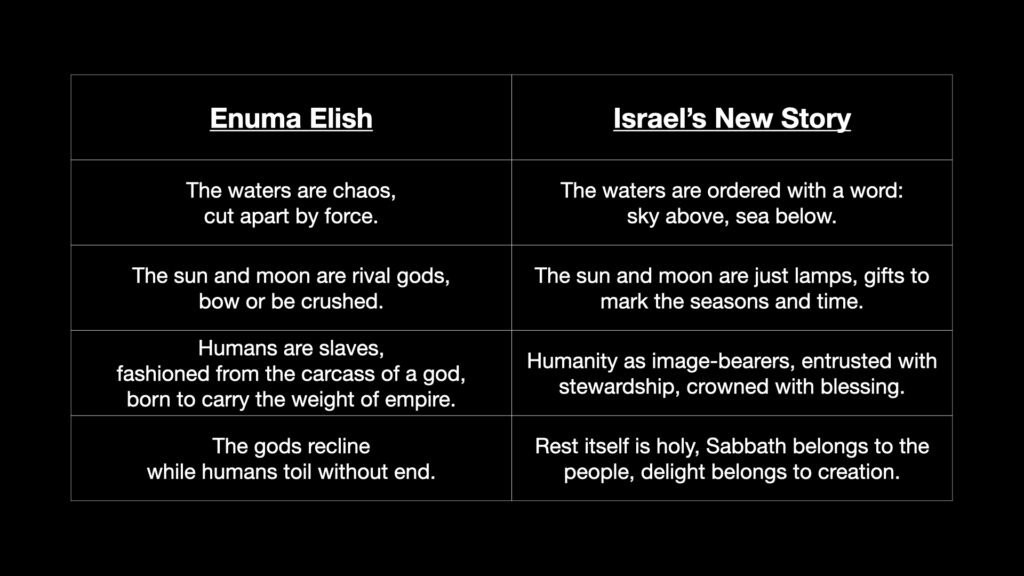
Is that more similar to Israel’s new story, or is that the Enuma Elish in red, white, and blue: violence makes peace, expansion makes security, consumption makes happiness. Human beings existing to keep the machine running. Your value is in what you produce, protect, and possess.
Critiquing America
I realize this could be hard to hear for many Americans. We’re told from childhood that this is the greatest nation on earth, a shining city on a hill. When I critique America’s story, it’s easy to feel defensive, to want to respond with bumper sticker patriotism: “Love it or leave it” or “If these colors offend you, let me help you pack your bags.”
Let me be clear: I do love this country. There’s a patriotism that acknowledges both the beauty and the brokenness of our shared story. I feel something genuine when I hear the national anthem. I’m moved by the ideals articulated in our founding documents, even while recognizing how profoundly we’ve failed to extend those ideals to all people.
There is something incredibly powerful about the American experiment: a government of the people, by the people, for the people. If we could actually embody the highest ideals of what the founders envisioned, ideals we have never fully realized, it would indeed make for remarkable governance in this world.
Patriotism vs. Nationalism
But there’s a critical difference between patriotism and nationalism. Patriotism loves what is best about one’s country while working to heal what is broken. Nationalism demands blind loyalty and silences critique. Patriotism says, “We can do better because we’re meant for better.” Nationalism says, “We are already the best, and questioning that is treason.”
As followers of Jesus, we’re called to a love that sees clearly. We don’t have to choose between uncritical devotion to America and total rejection of it. We can honor what is good while naming what is harmful, because that’s what love does, it tells the truth, even when the truth is difficult.
Babylon on the other hand demands nationalism. It tells its story so loudly you forget your own, drowning out every competing narrative and demands absolute loyalty. It even co-opts the language of faith, twisting pulpit and scripture into mouthpieces for empire, until the Bible itself becomes a tool to justify power rather than challenge it.
Jesus Is Our Genesis 1
That’s why Israel needed Genesis 1 in exile and it’s why we need the story of Jesus now.
Not empire’s myth, but God’s relentless love made flesh.
Not the story of a distant ruler demanding endless labor,
but God come near, dust on his feet,
hands reaching for lepers and children,
bread breaking open at tables of outcasts.
Not a god of conquest,
but relentless love taking on flesh,
entering our hunger, our wounds, our weariness.
On the cross, he absorbed empire’s violence
and religion’s fear,
and in the resurrection he unmasked them both,
declaring that love, not death,
has the last word.
And then comes the “what now.”
At Sinai, God said: “You will be my kingdom of priests.”
In exile, Genesis 1 whispered: “You are image-bearers.”
And now through Jesus, those voice echoes again.
“You are a chosen people,
a royal priesthood,
a holy nation,
God’s own beloved possession,
that you may declare the praises
of the One who called you out of darkness into his marvelous light.”
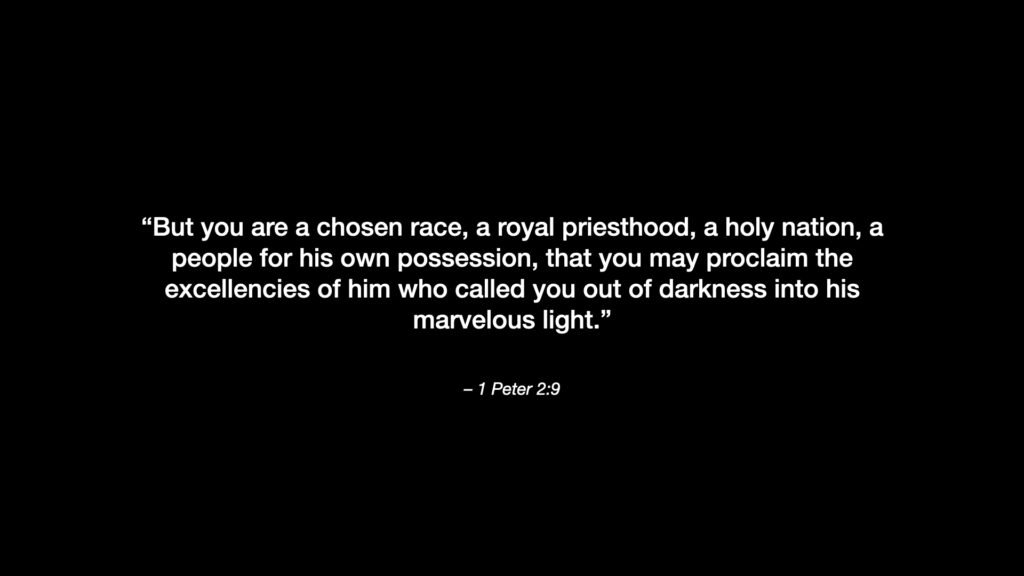
Do you hear the pattern?
Act of God, then way of life.
Exodus had Sinai.
Exile had Genesis 1.
And we, we have Jesus.
The relentless love embodied, crucified, risen,
and calling us to live as priests of that love,
not just in words,
but in every breath and every step.
Jeremiah’s Practices Today
But again, story alone is not enough. Once you know who you are and whose you are, you need practices to embody it. Israel didn’t just receive Genesis 1, they also received Jeremiah’s words: build houses, plant gardens, seek the peace of the city, pray for it. Story and practice together, that’s how you live in Babylon without becoming Babylon.
So let’s talk about those practices. Not just as ancient instructions, but as cues for us, right here, right now in Denver and around the world. What might it mean for us to build, to plant, to seek, to pray in our own context?

Build
Jeremiah says: Build houses. Live in them.
Babylon builds towers to its own greatness. America builds gated communities and walls. The church has often built fortresses of certainty, shutting people out. But Jeremiah’s invitation is smaller, humbler: build a home.
To build in exile is to create spaces of belonging. It might mean opening your living room table to neighbors who feel isolated. Or resisting the temptation to live life as a transaction and instead building communities that welcome people as family.
Wherever we are, to build is to say: love is not an abstraction; it needs walls and windows, tables and chairs, where people can gather and breathe.
Plant
Jeremiah also says: Plant gardens. Eat what they produce.
Empire trains us to consume without ceasing. To take more than the earth can give. To treat creation as disposable and people as resources. But planting is the opposite posture. It is slow and requires waiting. It depends on trust.
So perhaps planting looks like an actual garden plot: soil under your fingernails, tomatoes ripening in the sun. It might look like cultivating joy, rest, art, or friendships that grow over time instead of burning out in the rush of productivity culture.
Wherever we are, to plant is to practice patience. It is to choose rootedness over restlessness, cultivation over consumption.
Seek
Jeremiah goes on: Seek the peace and prosperity of the city where I have carried you.
Empire says: seek your own good. Protect your tribe. Secure your future. But Jeremiah insists: your good is bound up in theirs. You can’t separate your flourishing from the flourishing of your neighbors, even your Babylonian neighbors.
So seeking might mean showing up in conversations about housing and homelessness, advocating for equity in schools, or standing with communities targeted by injustice. It might mean working for peace where conflict rages, supporting just policies in your nation, or collaborating across divides.
Wherever we are, to seek is to live as if our wellbeing and our neighbor’s wellbeing are one and the same … because they are.
Pray
Finally, Jeremiah says: Pray to the Lord for the city, because if it prospers, you will prosper too.
Empire teaches us to pray for victory, for conquest, for our nation to stay on top. Christianity has often mimicked this, praying for power rather than for peace. But Jeremiah calls for something deeper: pray for the place where you are. Pray for the people around you, even if they don’t share your beliefs, even if they feel like enemies.
That might mean holding our neighborhoods before God, not as problems to fix but as beloved. Or praying for the flourishing of cities you’ve never seen, countries in conflict, communities living in scarcity.
Wherever we are, to pray is to keep our hearts soft, to keep our imagination open, to remind ourselves that God’s love is always larger than our tribe.
So how should we live?
Let me get personal for a moment.
My Life In Exile
I’ve recently moved back into my parents’ old house, the same home I first moved into on the last day of seventh grade. And as I’ve begun to reinhabit that space, I’ve asked myself: how do I build, plant, seek, pray here, right now?
Build
For me, building looks like opening that house not as a fortress but as a place of belonging. The property sits on about 1.1 acres, plenty of room not just for me, but for community. I’ve set aside part of the backyard specifically as a gathering space, and I’m designing the front landscaping so that it naturally draws people in, flowing from the street, through the front, around to the back, into a space where neighbors and friends can find connection through shared meals and conversations around a fire pit.
Plant
For me, planting looks like learning how to transform what has been lawn for years into living soil. I’ve begun exploring permaculture, permanent agriculture, principles that don’t just take from the earth but restore it. How do I not only nourish the ground, but cultivate it so that abundance flows from it? Right now I’m learning. I’m experimenting. But my hope is that these gardens will someday feed not just me, but produce enough to give away, food that nourishes bodies and friendship alike.
Seek
For me, seeking looks like leaning into the life of this neighborhood, asking where there is need, where there is ache, and how I can play even a small part in weaving peace. The house, the gardens, the community space, these aren’t just for me. They’re meant to become threads in a wider fabric of flourishing.
Pray
For me, praying looks like holding this neighborhood and this city before God, not as projects to fix but as beloved ones to bless. Every time I walk the property, every time I plan another section of garden or table, it becomes prayer: God, may this place be for others, not just for me.
That’s what it looks like for me right now.
Your Life In Exile
But what about you? What might it look like in your home, in your neighborhood, in your country? What does Build, Plant, Seek, Pray look like in your life?
And as we turn now to the Lord’s Supper, I want to invite you to carry that question with you. As you receive the body and blood of Christ, let it be not just a ritual but a declaration: “As I am in Jesus, may Jesus be in me. As I receive him, may he be expressed through me.”
Because this table is where the counter-story takes flesh. Here, empire is unmasked, assimilation is undone, and love becomes the food that sustains us.
So come with your questions, come with your longings, come with your “what now?” Then receive Jesus himself as the answer.
Dark cups are wine, light cups are juice. It is all the meal of God for the beloved of God … and just in case there’s any doubt, that includes you.
In Jesus name. Amen.




